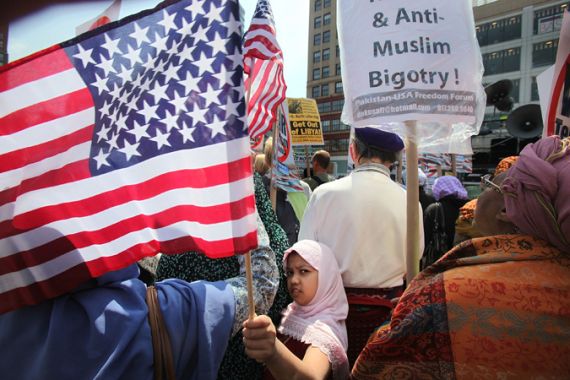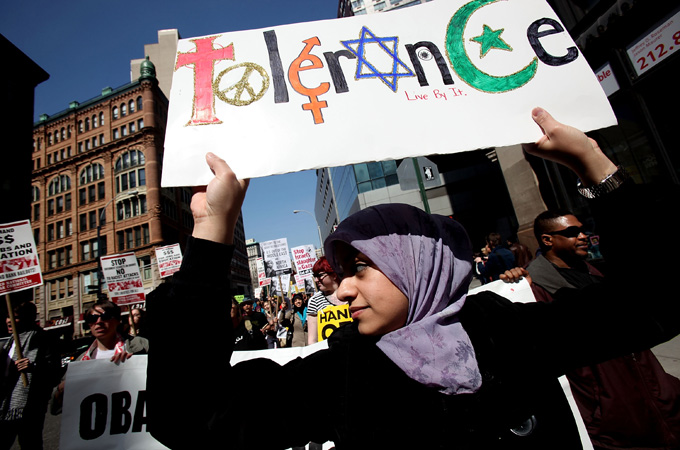The two faces of Muslim life in the US
While assimilation of Muslim communities in US society is laudable, a creeping Islamophobia is undermining it.

 |
| The US ideal is to provide a home for the hungry, the poor, the dispossessed – easier said than done [GALLO/GETTY] |
Washington, DC – The long procession snaked around an open, hash-marked field, while an amateurish band blared and tweeted into a darkening sky. Moments before, I had sat shivering forlornly in the stands, having been importuned by friends, somewhat against my will, to attend a high-school football game on a cold December evening.
But here was something which captured my attention, a bit of Americana which I had never seen before. Each of the graduating seniors from the home team, about to play in his last game, was circling the field, accompanied by his parents. When each group of three approached mid-field, their names were read out, and the crowd cheered them in turn.
As might be expected in this Washington-area suburb, the players and their parents made for a highly diverse assemblage. But as they paraded by, my eye was drawn to one trio in particular. Their clothing, and perhaps a certain meekness in their bearing, marked the parents as recent immigrants. The gentleman was slight and bandy-legged, his wife small and plumpish, wrapped in a dark hijab. Like the other mothers, she wore over her coat the outsize football jersey of her strapping son, who loomed over his parents, the product, no doubt, of a solidly hormone-enhanced American diet. I tried to guess at their national origin when the name was announced. Persian? Afghan-Tajik? One couldn’t be sure, and it really didn’t matter. What mattered was the face of this woman, her shyness at the crowd’s acknowledgement completely overwhelmed by beaming pride as she looked up at her son. I don’t believe I have ever seen anyone more happily transported in my life.
| Hearing into ‘radicalisation’ of US Muslims raises questions |
One might be forgiven a bit of nationalistic satisfaction at a scene which underscores the American ideal, which gives testimony to the notion that here is a place where the poor, the humble and the oppressed can find refuge, a place of tolerance where the son or daughter of the humblest immigrant can find acceptance and a fair opportunity for betterment, even if he or she represents a religion or a place of origin deemed threatening by others.
That swell of satisfaction, though, had had its counterpoint earlier the same day. While on a speaking engagement in New England, I had seen a reminder in the local press of the very different reception accorded to Muslims – and specifically Muslims – who may not seem so benign, and who do not assimilate so easily into the political and cultural mainstream of the US.
The trial of Tarek Mehanna, a 29-year-old product of suburban Massachusetts and Egyptian-born parents, was drawing to a close that day in the US First District Court in Boston. Mr Mehanna, it would appear, is an angry, and perhaps troubled young man. Seized of what he regards as US misdeeds in the Middle East, he had travelled to Yemen, allegedly to seek training in “terrorist camps”. Having failed to find such camps, or to gain such training, but perhaps having provided an earnest of his radical views, Tarek returned to the United States, where he contented himself instead by providing online English translations of al-Qaeda videos and texts. Such activities appear to have attracted the unfavourable attention of federal authorities. When Mehanna refused to become their informant, they were able to spin a pattern of inconsequential foreign travel and radical advocacy into a multi-count indictment, including “conspiracy to kill in a foreign country” and “providing material support to terrorists”.
A few days after my Boston visit, the jury, having been treated by prosecutors to regular references to bin Laden and exposed to images of the twin towers burning, handed down its verdict: Guilty on all counts. The reaction of the prosecuting US attorney was perhaps unintentionally revealing: “Once the government learned that Mr Mehanna – of his intentions toward America, especially American soldiers, and his increasing radicalisation, to have done nothing would have been inexcusable.” Yes, Tarek Mehanna’s views might well eventually have gotten him into trouble of a genuinely criminal sort, absent some intervention. The prosecutor clearly went to energetic lengths to help a good young man from going bad. As a result of those efforts, Mehanna will be eligible for life imprisonment when his sentence in passed down in April, which will make it far easier for the authorities to protect him from himself.
| Growing up Muslim in post 9/11 America |
There are right-wing blogs which conveniently provide a much more comprehensive inventory of the startlingly large number of terrorism indictments being handed down against Muslims in the US – far larger than a passing familiarity with the mainstream press would provide. Yes, there have been a small number of genuine terrorist conspiracies uncovered in the US since 2001, and yes, radicalisation in the US Muslim community is a genuine, if grossly exaggerated, concern. But one need not be either paranoid or a conspiracy theorist to wonder how it is that the vast majority of such so-called terrorism indictments lodged in the US seem to involve people who have engaged in little more than aggressive talk, and that invariably – at the centre of the purported conspiracy – is a federal informant.
To unravel this conspiracy one must take into account only two things: First, the palpable fear of Muslim radicalism afoot in the US, encouraged by certain self-interested politicians and magnified by an uncritical and sensation-seeking press; and second, that an ambitious federal prosecutor has the discretion to choose between a career of putting garden-variety bank robbers behind bars until he or she collects a pension, or making a genuine name for herself by bringing a high-profile terrorism case successfully to trial. Under the circumstances, it would not be so surprising that prosecutors might be tempted by various thinly disguised forms of entrapment.
There are many evils in the world that have at their heart bureaucratic banality. Such banality risks bringing Muslim America a half-step away from the thought police.
The United States can legitimately pride itself on the extent to which it is still capable of benevolently assimilating diverse peoples, creeds and cultures into its body politic. But the country also needs to awaken to the extent to which a creeping Islamophobia is progressively placing its freedoms, its values, its civic culture, and ultimately its security, at risk.
Robert Grenier is a retired, 27-year veteran of the CIA’s Clandestine Service. He was Director of the CIA’s Counter-Terrorism Center from 2004 to 2006.
The views expressed in this article are the author’s own and do not necessarily reflect Al Jazeera’s editorial policy.
